
Bolstering Trajectory of Pakistan’s Strategic Ties with China
April 18, 2025
PRESIDENT
Air Marshal Asim Suleiman (Retd)
SEMINAR COORDINATOR
Ambassador Muhammad Haroon Shaukat (Retd)
MASTER OF CEREMONY
Zaheen Qureshi
Executive Summary
A seminar titled “Bolstering Trajectory of Pakistan’s Strategic Ties with China” was organised by the CASS, Lahore, on 18 April 2024. The seminar featured four guest speakers. Ambassador Masood Khalid (Retd) the longest-serving Ambassador of Pakistan to China, gave an insightful talk on China’s growing global role. It was followed by an enlightening address by Ambassador Moin ul Haque (Retd), another former Ambassador to China, covering the full spectrum of bilateral ties. Dr Suhail Saleem highlighted the importance of SEZs and Dr Hassan Daud Butt delved into CPEC beyond 2030. An extensive Q&A session ensued, followed by concluding remarks by Air Marshal Asim Suleiman (Retd), President, CASS Lahore, who rounded up the seminar.
In his introductory remarks, Ambassador Muhammad Haroon Shaukat (Retd), Director Foreign Affairs, CASS, Lahore, highlighted China’s rapid rise as a global power amidst significant global transformations. He emphasised China’s vision of peaceful co-existence and win-win cooperation, which was gaining traction internationally. He underscored Washington’s concerns regarding China’s growing role and influence and its policy of containment of China through a web of alliances and partnerships. In this context, India has emerged as a key US partner in the Indo-Pacific region.
Regarding Pakistan’s strategic ties with China, Ambassador Shaukat emphasised their deep-rooted nature and a wide canvas of cooperation, particularly in the defence sector. The CPEC has significantly enhanced bilateral relations, with its first phase successfully focusing on energy and infrastructure projects. Some impediments and challenges had emerged which were being addressed in all earnestness. These were mainly due to COVID-19, economic difficulties, political uncertainty, and security concerns. Ambassador Shaukat outlined Pakistan’s resolve to pursue the second phase of CPEC, focusing on industrial development and broader economic cooperation.
In his keynote address, Ambassador Masood Khalid (Retd) made insightful comments regarding China’s role in global and regional geopolitics. He quoted Graham Allison: “The world has never seen anything like the rapid, tectonic shift in the global balance of power created by the rise of China.” The Global South has welcomed this development while the West is apprehensive. He emphasised China’s historical economic prowess and its recent resurgence, quoting figures from notable historians and economists. Ambassador Khalid traced China’s economic transformation from Mao Tse Tung’s era to Deng Xiao Peng’s reforms in the late 1970s, which transformed China into a socialist market economy and led to decades of double-digit growth.
Ambassador Khalid also discussed China’s holistic reform process, covering various sectors of the economy and governance. He pointed out that China’s focus on foreign direct investment (FDI) and international trade were key drivers of its economic growth. Ambassador Khalid elaborated on President Xi Jinping’s goals of “National Rejuvenation”, aiming to achieve moderate prosperity by 2035 and high-income status by 2049. He emphasised China’s peaceful rise and its commitment to multilateralism. China’s growing influence on the international stage was discussed as well. Today, China is the second largest contributor to the United Nations budget and a major troop-contributing country to Peacekeeping Operations.
Ambassador Khalid highlighted the American concerns about China’s rise and the consequent erosion of US dominance. He discussed the US strategy of containment and the formation of coalitions to counter China. However, the goal of Chinese diplomacy is to create a peaceful international environment, where it prospers along with others. He also elaborated upon China’s important role in regional geopolitics, particularly in South Asia and the South China Sea. Ambassador Khalid discussed China’s Belt and Road Initiative (BRI) and its implications for connectivity which is a strategic imperative for the country. He highlighted that India naturally has concerns regarding BRI. In conclusion, Ambassador Khalid discussed the ‘Thucydides Trap’ and the need for China and the US to manage their relationship peacefully. He emphasised the importance of cooperation to address global challenges and to avoid conflict.
Ambassador Moin ul Haque (Retd) shared insights on the significance of Pakistan’s strategic partnership with China, acknowledging it as a pivotal relationship deeply linked to Pakistan’s national security. He highlighted various dimensions of this partnership, stressing the strong government-to-government ties and the consensus across Pakistan’s political spectrum regarding the importance of this relationship.
Ambassador Haque advocated the need for ‘strategic clarity’ in understanding ‘Pakistan’s true friend’, particularly in terms of national security, amidst the US-China competition. He emphasised the need to further strengthen the strategic partnership with China. He stated that a mechanism of strategic dialogue existed at the level of Foreign Ministers. Pakistan has proposed to elevate such a dialogue to the level of the Prime Ministers.
In the economic domain, Ambassador Haque emphasised the key role of CPEC. He felt that future emphasis on economic cooperation with China should focus on four core areas, namely: i) industrialisation, in this endeavour, SEZs are crucial and must be developed on a business model, ii) Pakistan needs a comprehensive and long-term export strategy, iii) modernisation of agriculture as an important area of Phase II of CPEC, and iv) cooperation in the areas of science and technology, including green energy, AI, and aerospace, etc. Additionally, the speaker underscored the importance of defence and security collaboration, tourism, education, culture, and people-to-people exchanges, emphasising the enduring nature of the China-Pakistan relationship and the opportunities it presents for Pakistan’s future economic security and development.
Dr Suhail Saleem provided an overview of Punjab’s investment landscape, highlighting its attractiveness as an investment destination with 18 special economic zones (SEZs), one of which enjoys priority status under CPEC. He emphasised the substantial investment figures within these SEZs, totalling over $1 billion, with key sectors including textile, food and beverages, leather, chemicals, light engineering, packaging, healthcare, and pharmacy. Dr Saleem noted a shift towards private sector-driven SEZs due to challenges faced by investors in public sector SEZs, including location issues and bureaucratic hurdles in obtaining necessary approvals. Dr. Saleem highlighted the Punjab Government’s initiative to create Business Facilitation Centres (BFCs) under the “Punjab Ease” programme. In Lahore Centre, 31 government departments sit under one roof. This constitutes an important step towards the ease of doing business.
Dr Hassan Daud Butt delivered a comprehensive talk on leveraging the China-Pakistan Economic Corridor (CPEC) for sustainable economic growth beyond 2030. He emphasised the importance of effectively utilising CPEC and outlined challenges and strategies for success. Dr Daud highlighted the Gwadar Master Plan as a model for development, showcasing the Gwadar airport as a symbol of CPEC’s future potential. He stressed the need to prepare for Pakistan’s rapidly growing population and creating five million jobs annually by 2035. The speaker shed light on labour productivity issues in Pakistan compared to other countries, stressing the importance of addressing this gap for economic growth. Dr. Daud advocated utilising CPEC through energy projects, trade infrastructure, and green initiatives, enhancing agricultural productivity and attracting Chinese tourists. In conclusion, Dr. Daud stressed the need for a politically stable environment and continuity in long-term economic policies. He echoed the sentiment that success is achievable with pragmatic leadership and innovative approaches.
During the Q&A session, various important issues were raised. To a question regarding the possibility of China developing closer ties with India compared to Pakistan in the future, Ambassador Khalid and Ambassador Haque acknowledged that ‘China regards India as an important economic market and neighbour’ but highlighted the deep-rooted mistrust between the two nations, exacerbated by border clashes and India’s alignment with the United States. Despite China’s substantial trade and economic relations with India, a drastic shift in policy towards India seems unlikely as long as India remains a close strategic partner of the US. Both the ambassadors emphasised China’s unique strategic relationship with Pakistan which will continue to grow.
Responding to a question about China’s perception of Pakistan’s foreign policy strategy, particularly its close engagement with both China and the US, Ambassador Khalid emphasised that Pakistan did not need to be adversarial towards the US or China but should prioritise aligning itself with China’s interests.
Ambassador Haque acknowledged China’s expectations from Pakistan to support its interests but recognised the complexities in Pakistan-US relations and stressed the need for Pakistan to maintain a balanced approach. He highlighted China’s strong support for Pakistan and its understanding of Pakistan’s need for a mutually beneficial relationship with the US.
On a question regarding the perception of the Pakistani government’s lack of seriousness and commitment towards CPEC despite recognising its importance, both Dr Daud and Ambassador Haque attributed the problem to governance issues, including policy inconsistency and capacity challenges. Both stressed the need for pragmatic approaches to resolve impediments and to ensure the effective implementation of CPEC initiatives.
In his closing statements, Air Marshal Asim Suleiman (Retd), President, CASS, Lahore, highlighted China’s ascendency to remarkable heights of progress, stating that currently, it stood as a significant player in the evolving global landscape, wielding influence across various domains, ranging from geopolitics to financial markets. This commanding presence in the international arena stemmed from China’s strong economy and advanced military capabilities. China’s impressive economic growth has been a result of careful planning, hard work, and economic reforms. He appreciated Pakistan’s enduring friendship with China, noting its significance in thwarting regional adversaries and deepening collaboration across various sectors, including military cooperation and infrastructure development through projects like the CPEC. The President underscored the importance of CPEC in Pakistan-China relations, highlighting its role in fostering Pakistan’s development and serving as a symbol of China’s confidence in Pakistan. He also addressed the challenges posed by India’s attempts to sabotage CPEC and stressed the need for improved security measures to ensure the safety of Chinese citizens and project security within Pakistan’s borders.
The President highlighted China’s abiding support to Pakistan in the field of defence acquisitions and modernisation. He recalled China’s unwavering support for the Pakistan Air Force, notably through flagship projects like the JF-17, the recent induction of the Chengdu J-10C into the Pakistan Air Force (PAF) and plans for acquiring the fifth-generation J-31 Gyrfalcon stealth fighter. Indeed, China stands as Pakistan’s steadfast and unwavering strategic ally. In conclusion, he recalled mutual aspirations for peace, prosperity, and development that underpin the Pakistan-China partnership. He profoundly thanked the distinguished speakers for their insightful discourse.
Guest Speakers
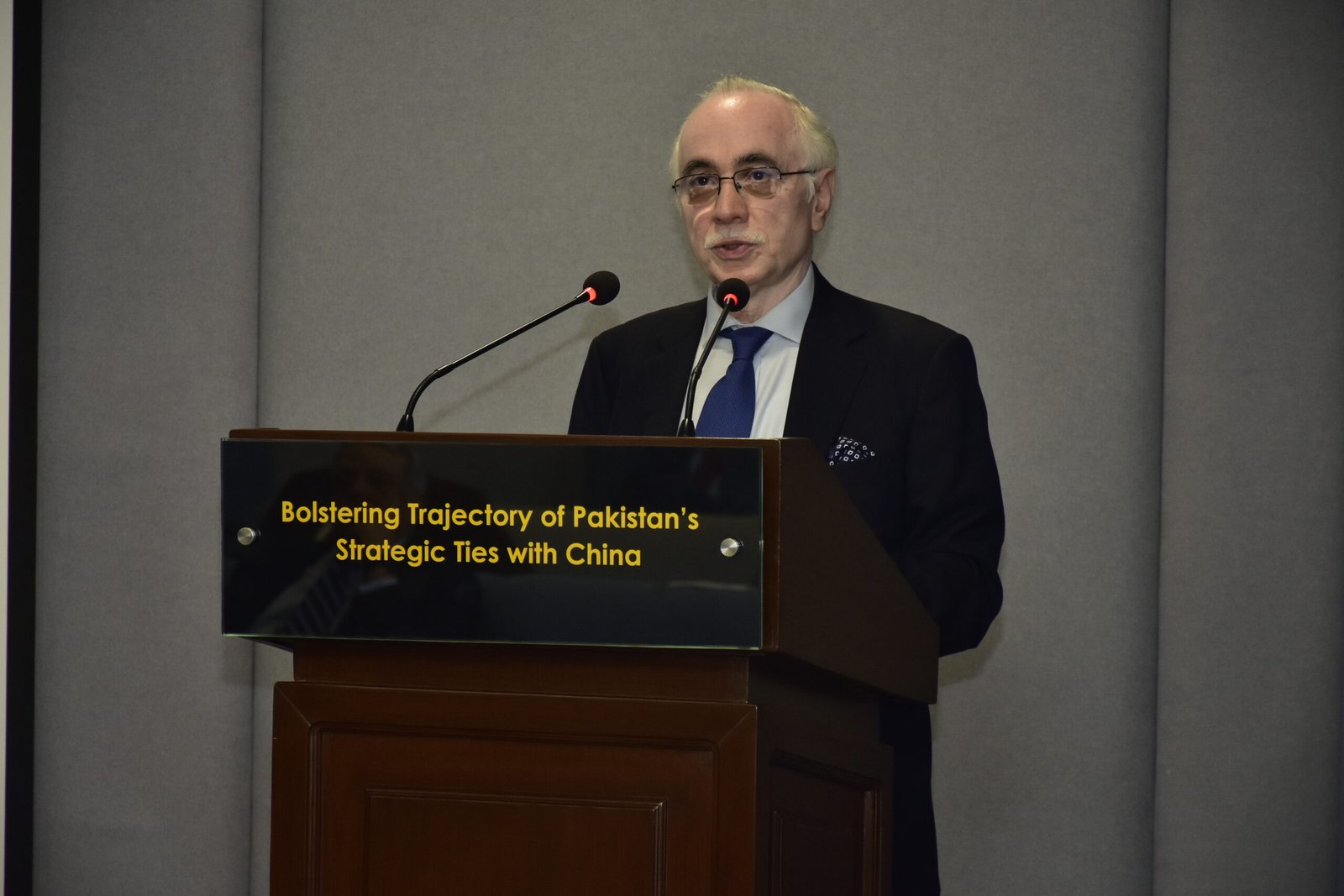
Ambassador Masood Khalid (Retd)
Former Ambassador of Pakistan to China
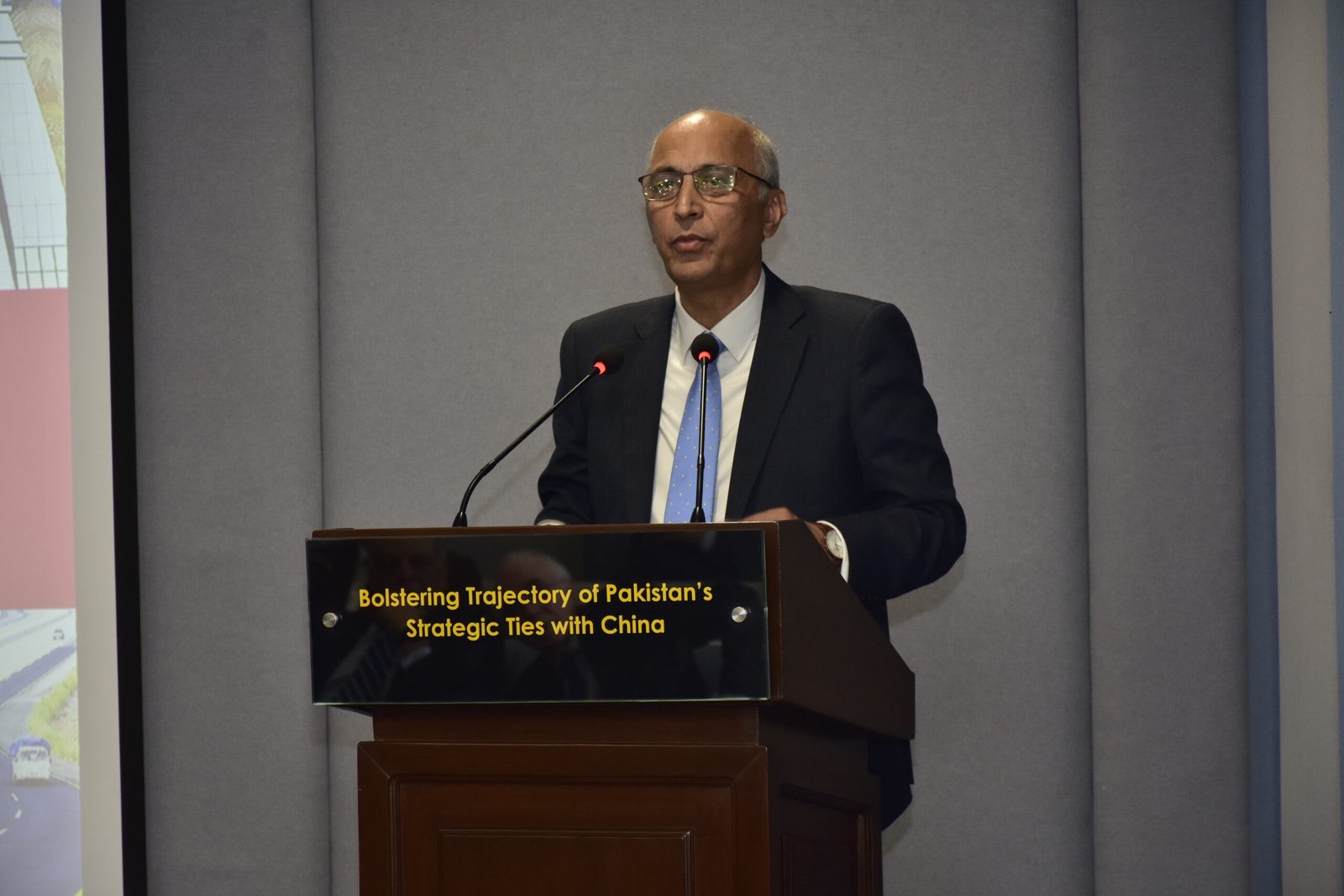
Ambassador Moin ul Haque
Former Ambassador of Pakistan to China
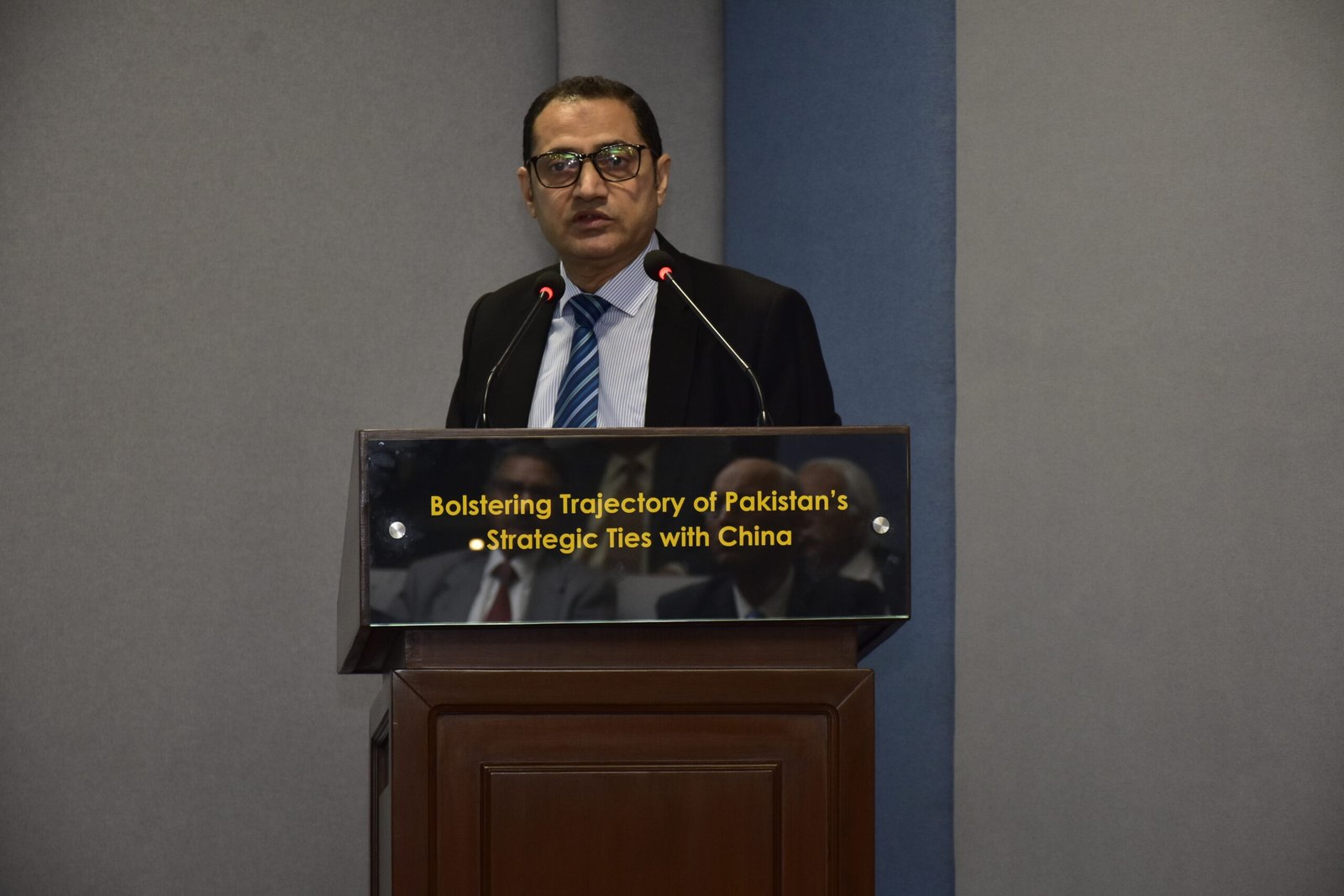
Dr Saleem Saleem
Director General Investment Facilitation and SEZ for Punjab Board of Investment and Trade (PBIT)

Dr Daud Hassan Butt
Associate Professor, Bahria University Islamabad
CASS Speakers
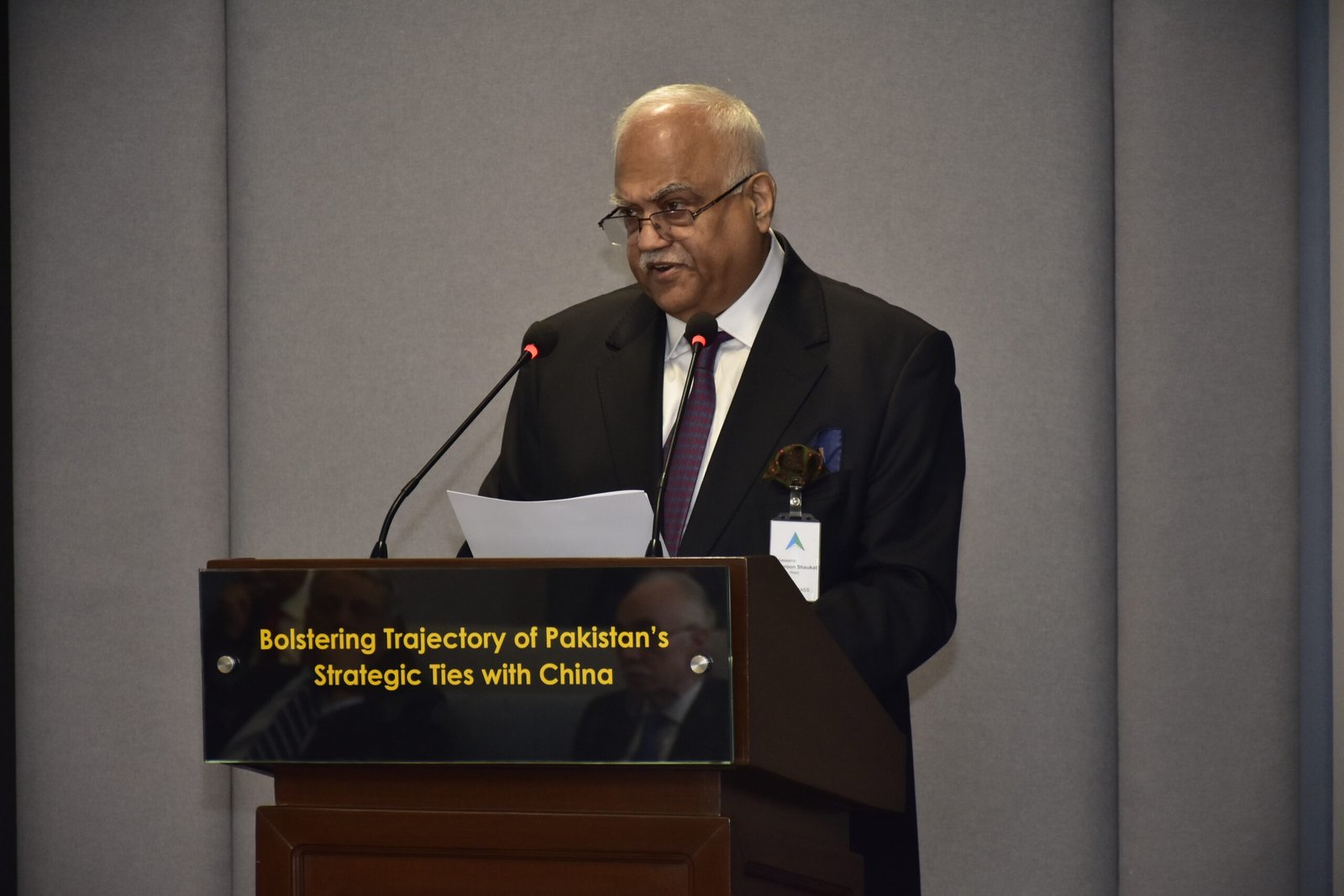
Ambassador Muhmammad Haroon Shaukat (Retd)
Director Foreign Affairs CASS, Lahore
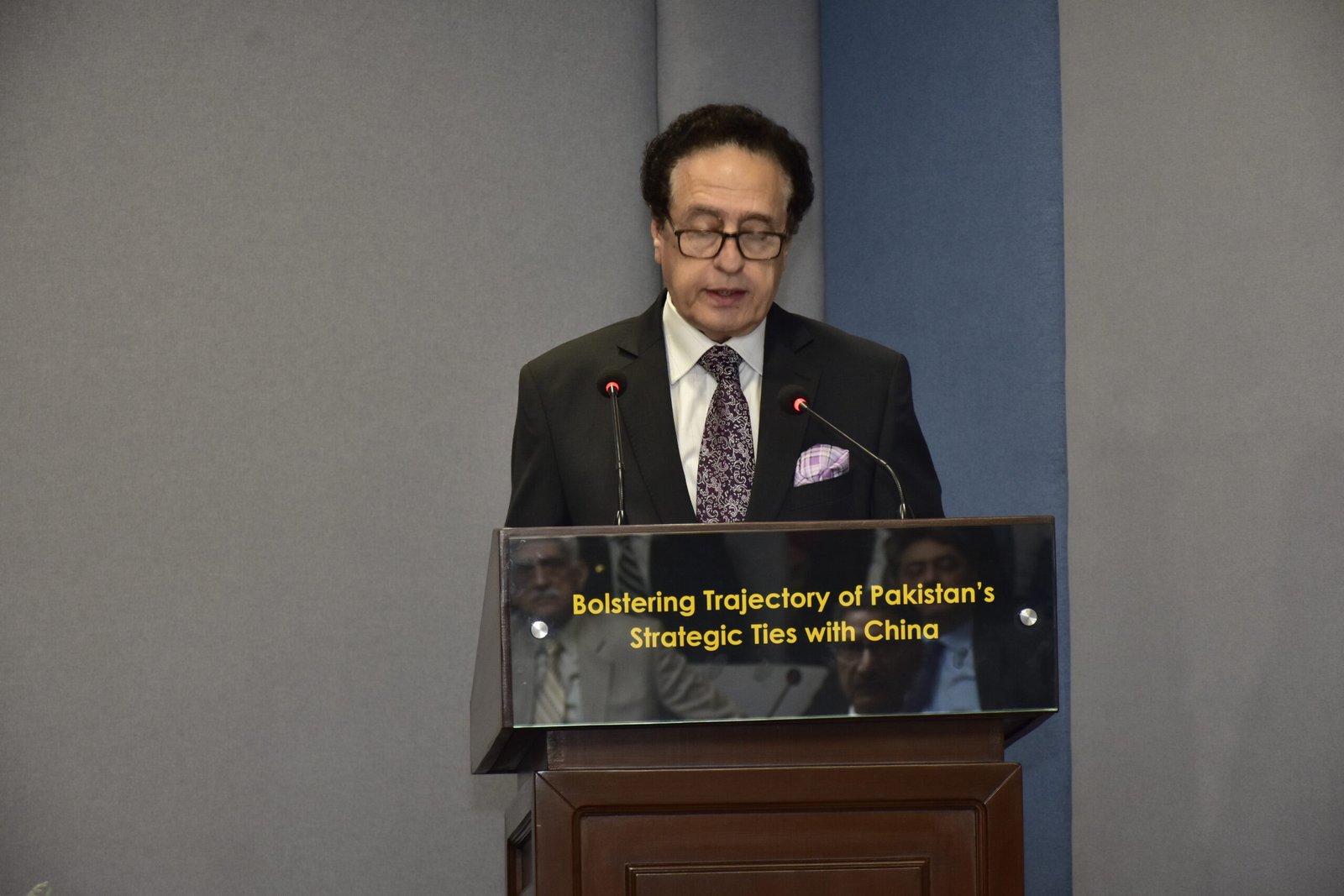
Air Marshal Asim Suleiman (Retd)
President, CASS Lahore
CASS LAhore

The Centre for Aerospace & Security Studies (CASS) was established in July 2021 to inform policymakers and the public about issues related to aerospace and security from an independent, non-partisan and future-centric analytical lens.


